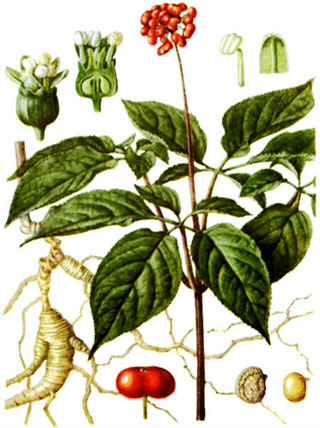Ginseng is an ordinary – Panax ginseng C. A. May
A perennial herb of the family Araliaceae (Araliaceae) height 40-80 cm. It grows in the Far East, in Northeast China and the Korean Peninsula. In medicine, used the roots and rhizomes plants.

The chemical composition of ginseng
The roots of the plant contain essential and fatty oils, sugar, starch, pectin, cellulose, nitrogen and nitrogen-free extractives, enzymes, B vitamins, iron, phosphorus, sulfur, manganese and other trace elements, as well as phytoestrogens and daukosterii. The most specific to the plant considered contained in the roots of triterpene glycosides (panaksozidы) — A, B, C, D, IS, F.
The pharmacological properties of ginseng
While ginseng is used widely and for a long time, its various products (Dosage Forms) We studied in detail only in the last 50 years in various types of laboratory animals. The main pharmacological characteristics of ginseng is its tonic effect. In investigating its effect on the CNS found, Ginseng potentiates the effects of known stimulants and analeptics (caffeine, kamfora, picrotoxin, fenamin) and is a physiological antagonist hypnotic action of some drugs (barbiturates, khloralgidrat, ethanol).
Under the action of herbal medicines ginseng marked strengthening of processes of excitation in the cortical neurons and stem of the brain and improve the reflex activity of animals. Depending on the investigated doses of ginseng observed different effects of its products on the inhibitory processes: in small doses, ginseng strengthens the processes of excitation and braking processes weakens, large doses, conversely, strengthens inhibitory processes.
In laboratory animals, ginseng preparations that increase efficiency and reduce fatigue during strenuous and stressful loads.
The nature of the action of ginseng on the cardiovascular system are not defined very clearly. In small doses of ginseng slightly increases blood pressure, and in large doses it reduces in various animal species. Under the influence of the drug has increased, the amplitude of the heart and slowing heart rate.
The range of pharmacological activity of the plants is very wide. For Example, Ginseng improves blood flow to the brain due to the expansion of cats pineal vessels, increases oxygen consumption animals, in high concentrations it causes a slight increase in motor activity of smooth muscle, It has antidiuretic properties, It has gonadotrophic action, several activates hematopoiesis.
Ginseng experiment stimulate the synthesis of nuclear RNA and RNA polymerase liver, increased DNA synthesis, squirrel, RNA and lipids in the cells of the bone marrow, increase the level of cAMP in the adrenal glands and the content oksikortiko- steroids in plasma. Besides, they increase the content of dopamine and norepinephrine in the brain stem, increase the activity of adenylate cyclase and main reduce the amount of serotonin in the cortex, It has a pronounced anti-stress properties, increase the resistance of animals to hypo- and hypertension, anti-inflammatory effect, accelerate the healing process and protect the animals from the toxic effects of some chemical agents.
The use of ginseng in medicine
Polymorphism of the pharmacological properties of ginseng root is determined by a wide range of its use in medicine. Ginseng is used as a tonic and restorative means for the treatment and prevention of various diseases of the central nervous system, improving the health and the body's resistance to stressful situations, adverse environmental effects.
Ginseng is effective in asthenic states and astenodepressivnyh various etiologies, when psychasthenic and hysterical reactions, accompanied by stupor, as well as various neuroses, insomnia and impotence. Patients in the appointment of tincture of ginseng significantly improves the general condition, disappear complaints lethargy and fatigue, Headache, improving appetite, It increases the overall tone. Besides, improves functional activity of the cardiovascular system.
The use of ginseng is effective in the period of convalescence after a serious illness, complex surgical procedures, long-term complications of various etiologies, as well as with long-term physical and mental fatigue. Increasing the stability of the main physiological systems of the patient to the harmful effects, ginseng significantly enhance the adaptive capacity of the organism.
Ginseng also has a positive effect on mental and physical performance of a healthy person. In the long course intake of the drug found its restorative action.
Posted a message about the positive effect of ginseng during myocardiodystrophy, at low and high blood pressure as a means of, regulatory pressure level, in the treatment of gastritis, as an immunostimulant in viral hepatitis during convalescence and hypoglycemic agents for diabetes, sexual disorders and atherosclerosis.
Ginseng facilitates the postoperative period in surgical patients (eg, appointment of ginseng extract in the preparation of patients with severe surgical intervention to avoid a number of complications). Several authors have noted in patients, taking ginseng, improving the overall condition, Appetite, anthropometric indices and increase efficiency. In the eastern countries, drugs are recommended for the plant life extension and youth.
At Ginseng clearly expressed seasonality action. Receiving it in the fall and winter is most effective. At other times of the year you need to take it in smaller doses.
Use of ginseng in the recommended doses are usually not accompanied by side effects, Sometimes, however, the administration of drugs may cause some discomfort, nausea and vomiting, increased blood pressure, Headache. Discontinuation or reduction of the dose leads to the disappearance of side effects.
Symptoms of intoxication were observed in humans after ingestion 200 ml of tincture or the use of a root of the average value. Poisoning Ginseng is characterized by the appearance of rashes on the body, dizziness, headache, fever.
Contraindications to the use of ginseng have been identified, However, it is not recommended for acute infectious diseases and other pathologies ostrotekuschey.
Dosage forms of ginseng, Dosing and Administration
Assign Ginseng tincture (Ginseng Tincture) inside (before meals) 15-25 drops 3 once a day. Powders or tablets, coated, take on the 0.15-0.3 g 3 once a day.
Store in a cool,, protected from light.
